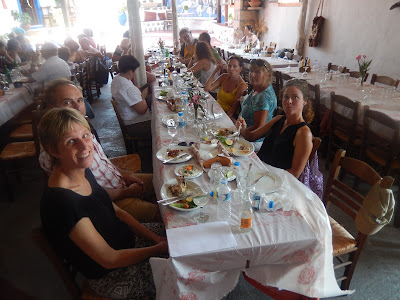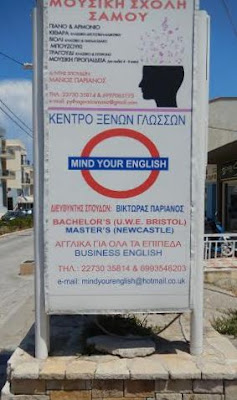 |
photos by Newell
|
Watermelon, Fireworks from the Grill,
and Cucumber Sorbet
by Alec Newell
 |
Heinrich Schliemann's Face of Agamemnon
National Archeological Museum of Athens
|
"Agamemnon, king of men, sacrificed
an ox,
a male five years old, to the exalted son of Cronos.
They flayed the beast, prepared and carved it up, chopping it skillfully
into pieces.
They skewered these on spits, cooked them carefully,
and drew them off. This done, they prepared a meal and ate.
No one went unsatisfied. All feasted equally"
Homer's Illiad,
Book VII - 370
Traditional American Independence Day celebrations are a hard thing to give up, even when you happen to be in a foreign country. As the old saw advises, "When in Rome..." or at least try to make some suitable adaptation to whatever country you happen to be in.
 |
ancient souvlaki skewers and brazier
National Archaeological Museum of Athens |
Meat cooked on skewers is a Greek tradition that goes back at least to the time when Agamemnon and his bronze-bright warriors camped, made sacrifices to Zeus, and feasted on brazed beef near the plains of ancient Troy. This time honored tradition is still a part of Greek cuisine that is today called souvlaki. In America it goes by the name of sish-kabob, the perfect choice for an American style cook-out with a Greek pedigree.
We generally use chicken or sometimes pork when we make souvlaki, but out of deference to far older traditions, I decided to use beef. Kathy put together some side dishes, I located a locally grown watermelon, and we invited Susan and Dimitris Trovas, a Greco-American couple and long time friends over to help celebrate.
 |
| ad hoc Greek cucumber sorbet |
By mid morning a bag of cucumbers had shown up on our doorstep which Kathy turned into another one of those on-the-fly dishes she creates from the unexpected vegetables that our neighbors frequently bring us. Some went into the salad, the rest got turned into a lime green cucumber sorbet we had for dessert.
Growing up, dessert was always something you got for eating all the vegetables on your plate, and if you don't count pumpkin pie, vegetables as dessert was something I'd never really considered before. It turned out to much better than what I'd imagined.
 |
| Beef souvlaki with onions and peppers |
The souvlaki turned out well too. Staring at the hot coals in the grill after dinner sparked a final thought on Agamemnon and the long-haired Achaeans - the regal simplicity of grilled meat and fire to celebrate the occasion. I think our guests enjoyed themselves too. To paraphrase lines from Homer himself, "No one went unsatisfied. All (had) feasted liberally"
 |
Real 4th of July fireworks or pyrotechnics
pʌɪrə(ʊ)ˈtɛknɪks/ from the grill
|














































